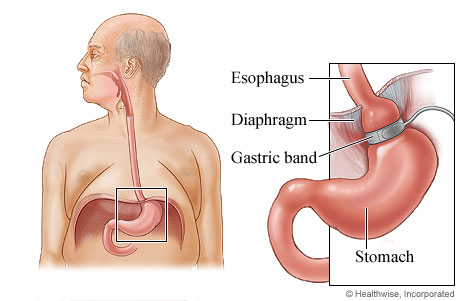Adjustable gastric band surgery: Overview
Laparoscopic adjustable gastric banding is surgery to help people lose weight. It makes the stomach smaller and limits how much food it can hold. This helps you eat less and feel full sooner.
You will be asleep during the surgery. The doctor will make several small cuts in your belly. Then the doctor puts special tools and a camera through the incisions. Next, the doctor wraps a silicone band around the upper part of your stomach to make a small pouch. Then the incisions are closed with stitches.
The small size of the stomach pouch means you will feel full after you eat a small amount of food. The doctor can adjust the size of the band by inflating or deflating it.
Why is adjustable gastric band surgery done?
Weight-loss surgery is suitable for people who are severely overweight and who have not been able to lose weight with diet, exercise, or medicine.
Surgery is typically considered when your body mass index (BMI) is 40 or higher. Surgery may also be an option when your BMI is 35 or higher and you have a life-threatening or disabling problem that is related to your weight.
It is important to think of this surgery as a tool to help you lose weight. It is not an instant fix. You will still need to eat a healthy diet and get regular exercise. This will help you reach your weight goal and avoid regaining the weight you lose.
Gastric Banding

A band is placed around the upper part of the stomach, creating a pouch. The band is adjustable, so the size of the opening between the pouch and the stomach can be adjusted.
After adjustable laparoscopic gastric band removal: When to call
Call 911 anytime you think you may need emergency care. For example, call if:
- You passed out (lost consciousness).
- You are short of breath.
Call your doctor now or seek immediate medical care if:
- You have pain that does not get better after you take pain medicine.
- You can't pass stools or gas.
- You are sick to your stomach or can't keep down fluids.
- You have loose stitches, or your incision comes open.
- You have signs of a blood clot in your leg (called a deep vein thrombosis), such as:
- Pain in your calf, back of the knee, thigh, or groin.
- Redness or swelling in your leg.
- You have signs of infection, such as:
- Increased pain, swelling, warmth, or redness.
- Red streaks leading from the incision.
- Pus draining from the incision.
- A fever.
Watch closely for changes in your health, and be sure to contact your doctor if:
- You have new or worse symptoms of reflux.
- You have trouble or pain swallowing.
- You do not get better as expected.
©2011-2026 Healthwise, Incorporated
